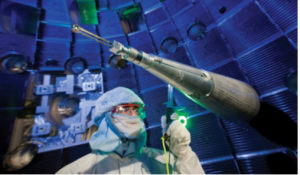
To Effectively Address Climate, We Need New Technology
Jonathan Chait has a blog post up, “Best New Republican Climate Ideas Still Pretty Bad” talking about how certain Republican pundits (he calls them reformicons) are trying to pivot away from denial of climate change and to a policy of incentivizing new technology.
I have two rejoinders to Chait. First – this is most definitely not a new idea. I’ve been working in and around Republican climate politics since 2006, and this has always been what we’ve pushed as the best way forward on climate policy. Admittedly, the voices of denial have been louder for the last five years, but for those really interested in solving the problem, this has been the way forward.
Second – the approach currently being implemented by the Obama administration, which Chait supports, will be very effective in the short term of reducing emissions (though it could’ve been more aggressive), but it faces real challenges in effectiveness over the long-term.
If we simply allow the EPA to ban certain types of high-carbon energy production, as the President’s Climate Action Plan will do, that will eventually raise prices. However, it won’t incentivize new technology, given how regulated the utility market is. As businesses always do, they will innovate around the margins for more efficiency, but I don’t foresee any technological breakthroughs coming out of the likes of PEPCO or PSE&G.
Chait says that the Obama Administration dealt with this problem by creating ARPA-E in 2009. Well – that would be true if ARPA-E were actually working. There are several problems with ARPA-E, and they basically boil down to the old Woody Allen quote from Annie Hall: “the food is terrible – and such small portions.” ARPA-E’s targets for energy development have been too short term: they have looked at ways to improve existing clean energy technologies (solar, wind, and batteries) instead of looking to develop the real game-changing technologies that could really alter the trajectory of emissions. ARPA-E has been funding the sort of incremental gains that the private sector would be funding anyway.
Then, ARPA-E has not received enough funding to truly make real breakthougsh in energy. The reason is because the scale of the energy market is huge: over $1 trillion per year. When put against that, the $400 million ARPA-E received in the 2009 stimulus (and it has received much less in every year since then) shows how small the investment is relative to the scale of the challenge. “Small portions” indeed.
To return to my first point – and maybe this is a reflection on what “Reform Republicanism” really is – the Republican Party had a pretty good position on climate policy by the second term of the Bush Administration. In 2005, Congress included the Hagel-Pryor “Climate Change Technology Deployment” amendment to the 2005 Energy Policy Act. That is still the only explicitly climate-focused legislation ever passed by Congress and signed into law.
Take a read of speeches in the Congressional record by then-Republican Senators Hagel, Craig, Alexander, Domenici, and Voinovich (start on page 13303), and you will see that the arguments being made by Manzi, Ponnuru, et. al are hardly new. Hagel, for instance, says
“The amendment my colleagues and I are offering is comprehensive and practical. Bringing in the private sector, creating incentives for technological innovation, and enlisting developing countries as partners will all be critical to real progress on global climate policy.”
Senator Alexander says:
“it is time to take a more significant step toward putting us on a path of transforming the way we create electricity in this country and use energy so that we can produce less carbon. A big part of that is the concern we have about what we might be doing as human beings to cause global climate change.”
If the party could get back to a place where these sort of speeches were common on the Senate floor, then we could get back to working on solutions, not denying the existence of the problem. The amendment was co-sponsored by Republican Senators Alexander (R-TN), Craig (R-ID), Dole (R-NC), Murkowski (R-AK), Voinovich (R-OH), Stevens (R-AK), along with Democrats Landrieu (D-LA) and Pryor (D-AR). We need to bring this sort of cross-party legislating back to these issues.
I worked for then-Senator Hagel from shortly after he passed the amendment into law, and he was always talking about how the best way to deal with climate change was not to rely on command-and-control government regulations, but to develop cleaner technologies and then share them around the world. Going further, Dana Perino, Bush’s White House Press Secretary, said in 2008: “We aren’t necessarily against cap-and-trade proposals.” As we remember, a market-based emissions reductions program was a Republican idea, first implemented under the Bush 41 Administration for sulfur dioxide and other pollutants.
Personally, I like to think the best policy for Republicans going forward is to support a market-based emissions reductions program (I like a fully-rebated carbon tax, like what former Congressman Inglis is proposing) combined with a massive government-funded next generation clean technology development program that would leapfrog us over the limitations faced by the current generation of renewable power (for example, development of fusion power).
Perhaps the problem is that this course of action is so eminently sensible that Democrats would end up supporting it – and then Republicans would have to change positions again to oppose the Democrats.






[…] Our Flashpoint Blog To Effectively Address Climate, We Need New TechnologyAndrew HollandThe party cannot continue to deny the existence of the problem. Fortunately, there is […]
Only liberals could believe that a tax can change the weather.
No – reducing emissions can change the weather (and only in the long term). The most economically efficient way to reduce emissions is a carbon tax. If you’d rather the heavy hand of government doing it, that’s what you’ve got now.
What’s your alternative?